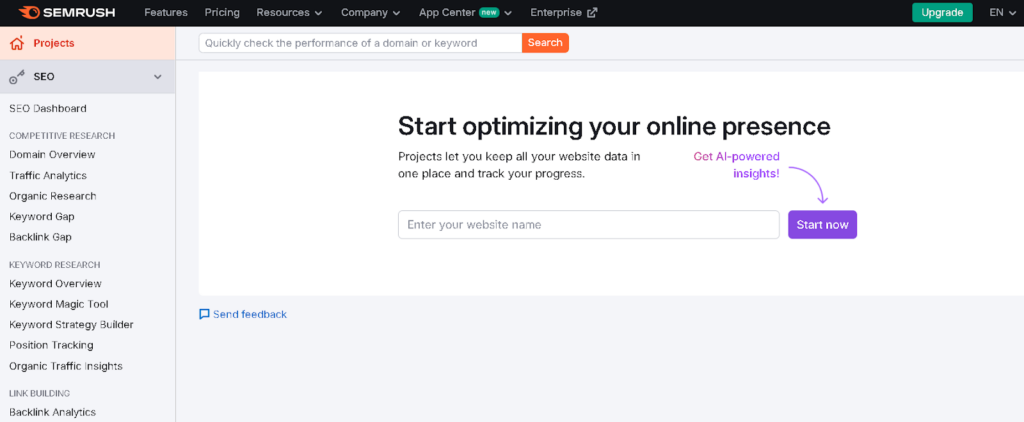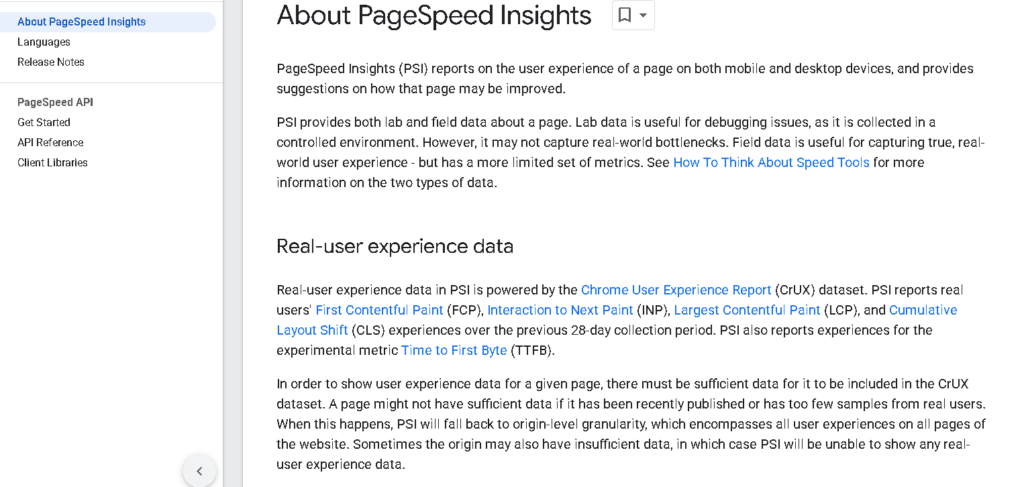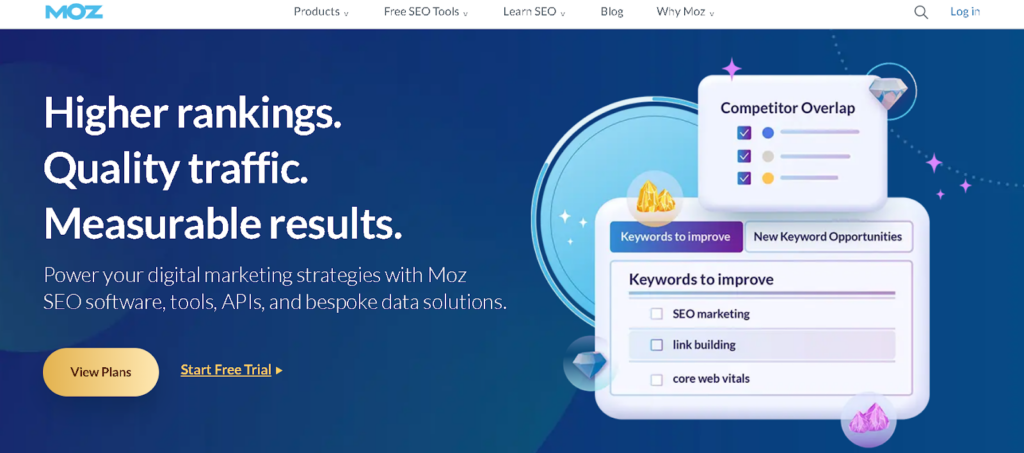When creating a website, every person and company hopes to see it succeed. However, the vision of every random visitor becoming a dedicated customer can only be realized through excellent website optimization and quality services. The latter depends on what products you offer, while the former requires special knowledge.
To attract a potential customer and hold their interest, your website must load quickly, have a high-ranking position on Google, and be intuitive. Fortunately, there are plenty of tools that can help you achieve this effect. In this article, we’ll make a detailed overview of the 10 best website optimization tools, underlining their strengths and weaknesses, considering their pricing, and establishing how to use them properly.
Hoping to make your website appealing to visitors, customers, and Google? Then hop in, and let’s get started!
Defining a Website Optimization Tool
A website optimization tool is a type of software used to improve the performance of an online platform. You can use it to assess the speed with which your pages load, understand your search ranking results, see how many visitors become clients, and judge how mobile-friendly a website is.
Good tools deliver good results. The revenue that comes from digital platforms amounted to 8.49 billion U.S. dollars in 2019, and this sum is expected to double by the middle of 2026. Based on this fact, it’s clear that the better your website performs, the more profit it will bring you.
Website optimization is the best tool for gaining an edge over your competitors. With its help, you’ll see all the drawbacks of your website, including those that aren’t easily visible, fixing them and improving its overall performance.
Types of Website Optimizations to Consider
There are several types of website optimization you might consider for your platform.
- SEO Optimization. The higher ranking your website has in Google, the more people will see it, so using SEO tools is a must these days;
- Mobile Optimization. Making your website optimized for mobile devices is one of the quickest ways to success, as more and more people prefer to use their smartphones rather than rely on traditional web browsers;
- Content Optimization. Your content must be optimized for your audience: it should have a high level of quality and a perfect balance of relevant keywords;
- Page Speed Optimization. Speed-focused tools allow boosting the loading times of each page: the faster your website becomes accessible to a visitor, the better;
- User Experience Optimization. Site navigation should be flawless, just like every interaction between your customer and your platform;
- Security Optimization. People prefer to deal with websites that respect their privacy and protect them from cyber threats, so it’s vital to have strong security and check for danger regularly;
- Conversion Rate Optimization. Tools from this category analyze how often your visitors perform the actions that convert them into customers, such as signing up and making purchases.
If you use the tools offering multi-layered optimization, your website improvement process will be smooth and 100% effective.
What Makes the Best SEO Tool?
If you’re choosing the best tool for your website, you need to consider several important factors. The first one is the ease of use. Learn more about the tool you’re thinking of getting: does all the info seem clear? If you can’t figure out what to do without contacting support, then using this tool is not a good idea.
Then, there is the list of optimization features. All the tools differ in terms of what they offer: some are focused on SEO optimization, while others help improve the loading speed of a website. The more features you can get in one tool, the better.
The pricing is also worth considering, especially if your resources are limited. There are plenty of cost-effective options, so go for them. Don’t think that overpriced tools will deliver the best possible results, but also don’t expect miracles from cheap or free versions.
Finally, there is an aspect of integration. If a tool works with WordPress, Google Analytics, etc., that’s great. If it doesn’t, you might have to look for a good option elsewhere. Choose wisely, and don’t be afraid to change the tools if the need strikes.
Top 5 Best Optimization Tools for Your Website
A thorough analysis of various website optimization tools allows for distinguishing ten specific options. Some of them are older, some are newer, but they all deserve your attention.
Tool 1: Google Search Console

Let’s start with the most basic tool. It’s Google Search Console, an option that almost every webmaster has used at least at some point in their work. It’s primarily focused on SEO, mobile, and user experience optimization.
If you want to understand how your website ranks on Google, you can do it with GSC. If some technical issues are present, this tool will identify them and offer you efficient solutions. You can also establish your indexing status with its help.
Here’s what else you need to know about it.
Pros
- Free to use. GSC comes from Google, and it doesn’t cost its owners a thing;
- Intuitive interface. There is no need to sign up, and it’s easy to understand what features to use in what way;
- Works with real data. GSC relies on Chrome User Experience Report, so it works with real user metrics;
- Offers simple solutions. You can easily remove crawl issues and various indexing problems with the help of this tool, as its solutions are simple to understand.
Cons
- No proper competitor analysis. You can see how your website performs, but there is no way to check how your competitors are doing, which is essential for many businesses;
- Limited keyword tracking. While you’ll see your ranking and the issues with it, the info will be very limited, lacking true nuances;
- No automatic fixes. GSC users receive ready-made solutions to their issues, but to implement them, they’ll have to apply manual effort: you won’t be able to just click “fix it”.
As you see, this is a good tool — it remains relevant even in 2025, but it does have its weaknesses.
When to Use GSC
If your website is new and you’re just starting out, you might find GSC beneficial. It’s totally free, which is a definite plus, and it can teach you some basic things about your site’s performance.
However, that’s where the problem lies — everything about GSC is basic. You won’t get any in-depth insights that will allow you to drastically change your approach to website maintenance. If you want some minor improvements, then this tool will be a great fit, but if you’re interested in making major changes, you should consider other options.
Tool 2: Ahrefs

Ahrefs is an advanced tool that has been in active use since 2011. It’s perfect for people interested in SEO, content, and conversion rate optimization, and it specializes in backlink and traffic analysis.
People who love Ahrefs are mostly SEO specialists that work specifically with link building and need help refining their strategies. Those who want to learn more about their competitors also benefit from Ahrefs, as it delivers a detailed analysis and helps make fact-based conclusions.
Here are the pros and cons to consider before its usage.
Pros
- Top backlink analysis. This tool covers a wide range of websites, so its backlink analysis brings the highest value for the user;
- Extensive competitor analysis. With Ahrefs, you’ll be able to study the performance of your competitors thoroughly, deriving valuable insights and acting on them;
- In-depth keyword research. You’ll be able to find key ranking opportunities by establishing the search volume of various keywords;
- Content explorer. This tool analyzes content based on social shares, showing you what is popular and which texts fall short of expectations.
Cons
- No free plan. There is no free version of Ahrefs, which is bad news for those who don’t have many resources to spare;
- High rates for usage. The starting plan costs $129 per month, and it allows working only on 5 projects and seeing historical data for the last 6 months;
- Overly advanced. There are plenty of features in this tool, and while they are helpful, it takes a while to learn how to use them properly.
The cons won’t seem extensive to big businesses and professionals, but the owners of smaller websites might really struggle with them.
When to Use Ahrefs
Ahrefs is a perfect tool for SEO professionals and businesses that want to get a complete picture of their website’s performance. A feature called Content Explorer allows identifying the most popular topics and understanding why they are trending, while thorough backlink analysis helps refine link-building strategies.
The keyword analysis from Ahrefs is also top-notch. Website masters who want to find keywords that generate lots of traffic yet have a low level of competition will consider it an excellent fit.
However, smaller businesses might not like it. Ahrefs is expensive, and it’s not easy to figure out how to get maximum benefits from it. If you’re a newbie, it’s better to start optimizing your website from simpler options and then move on to more advanced ones.
Tool 3: SEMrush

SEMrush is another advanced tool that covers SEO, conversion rate, and content optimization. It specializes in such areas as competitor analysis and keyword research, and people interested in elevating the health of their websites often choose it because it has a diverse list of features.
Here are the elements it is best known for.
Pros
- Excellent competitor research. This tool will demonstrate how successful your competitors’ websites are and what strategies help them boost their traffic;
- Many content optimization features. A special online writing assistant will help improve the quality of your content, making it more readable;
- Full SEO package. You can see the ranking issues with your website and analyze the keywords you’re using, as well as identify the new potentially lucrative options;
- Insights into PPC advertising. If you’d like to learn more about the paid strategies and how they are doing, SEMrush will help you.
Cons
- Overly expensive. The cheapest package costs $139.95 per month, so most startups might not be able to afford it, at least not on a regular basis;
- Deals with too much data. SEMrush bombards its users with significant volumes of data all at once, which might be difficult to handle, especially for newbies;
- Backlink database is not extensive enough. Compared to some other tools, SEMrush cannot offer its users a truly insightful backlink analysis.
The cons aren’t that bad, and in the right hands, they can be easily compensated by the pros.
When to Use SEMrush
You should turn to SEMrush when you need an advanced tool that gives you a chance to analyze your competitors and improve every issue harming your website’s ranking, including the smallest ones. If your needs are relatively minor, though, then there is no need to use it — the price is too high, and the volume of info you’ll receive might feel overwhelming.
However, if you want to get a detailed content marketing toolkit, access device tracking features to understand your audience’s preferences better, and do detailed keyword research, SEMrush will suit you for sure. There are three packages available, and bigger businesses can choose the one that works best for them.
Tool 4: Google PageSpeed Insights

This is another tool from Google that offers free opportunities for speed, mobile, and user experience website optimization. If these are the areas you worry about, you’ll get good suggestions to fix the identified issues and improve your overall positioning.
As statistics show, Google holds the biggest traffic worldwide. Its traffic share has reached 89.62% in 2025, which is an absolute record compared to other search systems. That’s why appealing to Google is the most effective way to make your website visible, and Google-based tools can really help with this.
Check what defines GPSI.
Pros
- A free tool from Google. GPSI is absolutely free, so you can try it even if you aren’t thrilled with the features and functionality it offers;
- Personal suggestions for speed improvement. This tool provides clear recommendations for boosting the loading speed of your website, thus optimizing your visitors’ experiences;
- Comments on Core Web Vitals. Getting these comments is vital for those who want to follow all Google guidelines to improve their web ranking;
- Works with real user metrics. GPSI uses Chrome User Experience Report, so its suggestions are based on real data.
Cons
- Some recommendations aren’t actionable. While GPSI delivers many solutions, some of them are unclear and might require additional knowledge that non-professionals lack;
- No continued performance monitoring. You can see a real-time snippet about your site’s performance, but you won’t be able to track it over time, which is critical for long-term success;
- Limited features. Some key features are missing or are severely underdeveloped, with competitor analysis being among them.
Even with the cons, using this tool might be a good idea since it’s 100% free.
When to Use Google PageSpeed Insights
Users, companies, and website owners should use this tool when they are just starting to explore website optimization opportunities. Additionally, this will be a good idea if you’d like to better understand how Google grades various platforms.
To guarantee the fast performance of your website, you’ll need to get a score of 90 or more. GPSI can help you here. However, it won’t be useful for more experienced businesses — these ones might need more advanced tools.
Tool 5: Moz Pro

Moz Pro is ideal for SEO and content optimization. Its side audits are extensive and thorough, and its keyword research is among the most effective in the market.
The reason that makes Moz Pro stand out in particular is its user-friendliness. This tool has been around for many years; a lot of professionals use it, but it keeps its features comprehensive and never overcharges its users. That’s not to say it has no cons, though.
Pros
- Domain authority metric. It’s a special metric designed specifically by Moz Pro to evaluate your website’s credibility in the online field and determine its ranking;
- User-friendly interface. Despite being an advanced tool, Moz Pro has a straightforward system that even a completely new user will find comprehensive;
- Affordable rates. The price for the first client package is only $49 per month, which is pretty affordable by market standards;
- Detailed site audits. If there are any issues negatively impacting the performance of your website, Moz Pro will locate them;
- Good link-building insights. You’ll be able to get a complete spam score and see quick results of a backlink analysis.
Cons
- No full-time free version. It’s impossible to get a permanent free version of Moz Pro, which might be a turn-off for some potential customers; the free trial is very brief;
- Very limited starter packages. While the minimalistic client packages are cheap, they also come with limited opportunities, allowing you to track only 50 words per month;
- Backlink database is not extensive. Moz Pro offers good backlink research, but its databases are not as informative as those in other similarly priced tools.
Moz Pro is among the best tools for website optimization in 2025, but not everyone will find it beneficial.
When to Use Moz Pro
It’s a great idea to use Moz Pro when you want to learn what kind of authority your website has. There is an extra benefit for those interested in doing competitor analysis — if you want to learn how your rivals are performing and why they’re succeeding, this tool will help you find relevant insights.
Each page on your website has its own ranking, and if you plan to improve them all, Moz Pro can become your assistant. It offers unlimited scheduled reports, and there are four packages to choose from, from cheap to really expensive ones.
Finally, this tool should be your choice if you appreciate having a support team available to you 24/7. The operators can help you solve any occurring issues and consult you in case you don’t understand how to use this or that feature.
Achieve Better Website Optimization
There is a huge number of website optimization tools out there. The ones we mentioned above have proven to be the best in terms of performance, price, and functionality, so take a close look at them. Evaluate your needs, narrow down the factors that matter most to you, and start improving your website.
Sometimes, you might need to use several tools at once. That’s fine; many businesses do the same. Take your time to learn everything before making a final decision.
